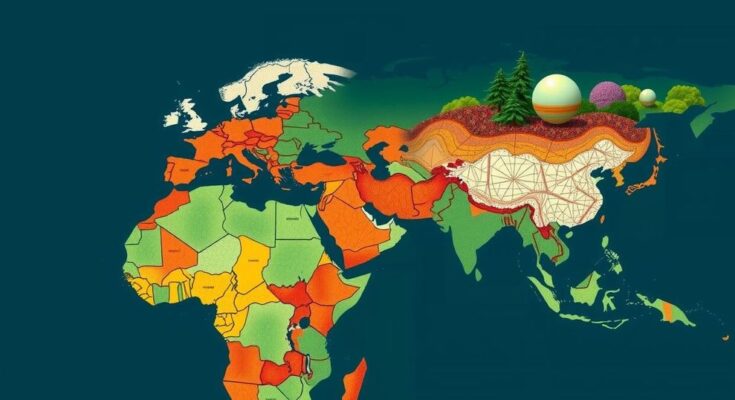Wealthier nations are initiating compensation for climate-related damages in poorer countries. Following Cyclone Freddy, which devastated Malawi, financial aid has facilitated recovery efforts for affected families. Approximately $720 million has been pledged to support vulnerable nations, but experts warn that this amount may be insufficient as climate disasters intensify. Negotiations are continuing at COP29 to finalize the operational framework for funding allocations.
Recent initiatives demonstrate that wealthier nations are beginning to compensate poorer countries for damages incurred as a result of climate change. Cyclone Freddy devastated southern Malawi in early 2023, leaving many families like that of Christopher Bingala severely affected and in dire need of assistance. Following the disaster, the Scottish government provided Bingala with approximately $750, enabling him to reconstruct his home after losing both property and livestock. This initiative is part of a broader movement towards establishing a dedicated fund aimed at addressing climate-related losses in economically disadvantaged countries, which tend to contribute minimally to global emissions yet are disproportionately impacted by climate disasters.
As of now, approximately $720 million has been committed from various wealthier countries, including the United States, the European Union, and the United Arab Emirates, in an effort to support vulnerable nations. However, climate experts caution that given the increasing intensity of natural disasters, this funding may prove insufficient. Currently, negotiations are underway at the COP29 climate summit in Baku, Azerbaijan, where discussions focus on the financial responsibilities owed to developing nations in the context of “climate finance.”
The impact of Cyclone Freddy was extensive, displacing over 650,000 individuals in Malawi as severe rainfall inundated the region. Bingala recounts how his family resorted to consuming deceased livestock during their dire food shortage after seeking refuge. With the financial aid received, he was able to relocate and rebuild in a less hazardous area. Though challenges remain, including obtaining resources for his children’s education, Bingala expresses a sense of relief that his family now resides in a safer environment.
Scotland’s pioneering payment scheme positions it as the first nation to allocate specific resources for loss and damage. Non-profit organizations, like GiveDirectly, have facilitated the distribution of funds to affected families, enabling them to invest in rehabilitative measures. Experts highlight that low-income households in developing nations often lack the necessary protections against extreme climate events, exacerbating their vulnerability.
The pilot program in Malawi is indicative of a larger strategy aimed at supporting countries that contribute minimally to climate change yet suffer its gravest effects. Increasingly severe weather incidents necessitate substantial funding, projected to soar to $250 billion annually by 2030. Prime Minister Philip Davis of the Bahamas has articulated the urgent need for greater contributions from wealthier nations, emphasizing that failing to act will lead to irrevocable humanitarian crises affecting global stability.
Conversations at COP29 aim to finalize the operational framework for the loss and damage fund, detailing eligibility and fund allocation. Many developing nations advocate for the fund’s use beyond disaster recovery, suggesting that it could support preemptive measures against sea-level rise and protect cultural resources. The escalating demand for such funding underscores the reality that climate change is a rapidly growing global issue that requires a comprehensive response from all nations.
The topic of climate change compensation is increasingly relevant as developing nations experience disproportionate hardships due to extreme weather conditions. Many low-income countries, despite minimal contributions to global emissions, are vulnerable to the devastating impacts of climate change, demonstrating the necessity for a supportive funding structure that aids in recovery efforts. Recent discussions among countries at climate summits underscore the urgency of addressing these inequities through dedicated financial mechanisms.
In summary, the emerging framework for loss and damage compensation reflects a critical shift in addressing the impacts of climate change on vulnerable nations. As wealthier countries begin to assume responsibility for the effects of global warming, the dialogue at COP29 indicates a growing recognition of the need for sustained financial support and strategies to empower impacted communities. Without adequate funding and proactive measures, the repercussions of climate change will continue to escalate, creating challenges that transcend national borders.
Original Source: www.keranews.org




